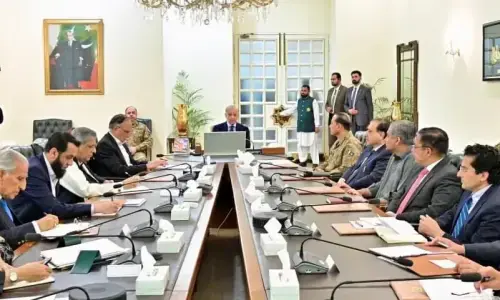THE year witnessed a significant de-escalation in terrorist and sectarian attacks in south Punjab as militant violence mostly shifted elsewhere, mainly to the northern cities, in the province.
Apart from a deadly attack on a gathering at the election office of Pakistan Muslim League-Nawaz (PML-N) legislator Amjad Farooq Khosa in Taunsa near DG Khan in mid-October and a suicide raid in Multan, no other significant incident of violence took place in the southern Punjab that made headlines a year earlier as the hub of nationwide militant activity, especially in Urban Pakistan.
Having said that, the ‘footprints’ the militants left behind elsewhere in the province have more often than not led the investigators back to the southern districts to hunt for suspects and their abettors. “Even of the two California shooting suspects, Tafsheen Malik had links with south Punjab,” a former Punjab counter-terrorism official sighed.
It, therefore, surprised few when police claimed to have arrested 140 suspects from south Punjab just days after a suicide bomber assassinated provincial home minister Shuja Khanzada along with several others at his election office in Attock in mid-August.
“The arrested suspects were linked to various banned faith-based militant organisations active across the province and some of them carried a bounty on their head,” a Punjab police official had said at the time.
A spokesman for Jamaatul Ahrar, a splinter group of the banned Tehrik-e-Taliban Pakistan (TTP), claimed responsibility for the attack and said it was carried out to avenge the killing of Malik Ishaq, the emir of the deadly Lashkar-e-Jhangvi. He went on to say that the attack was carried out with the help of a banned group active in Punjab.
Malik Ishaq’s killing on the outskirts of Muzaffargarh, again a south Punjab district, in a ‘shootout’ with his supporters who were trying to free him revved up hopes that the provincial government had finally woken up to the challenge and was ready to destroy terrorist infrastructure. However, all hopes were lost when the government failed to initiate a comprehensive police operation.
Even though the National Action Plan (NAP) promises to take action against seminaries involved in militancy, the government has dithered on bringing them under control for fear of backlash from the religious parties as well as the militants.
Police claims having carried out intelligence-based operations throughout the province, denying the presence of a strong network and infrastructure of banned militant groups in south Punjab.
“You do not conduct large-scale operations in any area just on the basis of speculation and public perception,” a police official said, adding: “It is not feasible to undertake such an operation in cities. We’re conducting search raids across the province and not just in one particular region.”
Though the official claimed to have arrested hundreds of suspects, killed many, and recovered arms and ammunition, but was not prepared to concede that the militants still have a large network in the region.
Analysts believe that south Punjab, with thousands of seminaries and a history of having provided foot soldiers to militant and sectarian outfits for decades, now offers a promising opportunity for Islamic State (IS) to strengthen its network in the region.
“The main battle has to be fought in the tribal backyard, but the job will remain half-done unless the militant sanctuaries and support networks in the cities both in southern and northern Punjab are completely dismantled,” warned a Lahore-based security analyst.




































